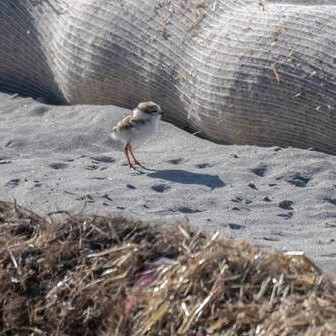When Piping Plovers Closed Down Rhode Island’s Nudist Beach
Wednesday, June 13, 2018
In the late 1980s a battle emerged between federal officials’ efforts to protect the breeding environment of piping plovers and Rhode Island’s nudists and their use of the same spot — Moonstone Beach in South County. And, of course, add in a little political intrigue.
The piping plovers are a federally protected endangered species.
Today, a portion of RI State Beach Roger Wheeler has been closed down for piping plovers who have been nesting in the parking lot.
GET THE LATEST BREAKING NEWS HERE -- SIGN UP FOR GOLOCAL FREE DAILY EBLAST“This pristine swath of shore and marsh in the Trustom Pond National Wildlife Preserve is one of the last New England habitats for the clothing-optional set. And, in a world where scarcity gets more plentiful every day, it is also one of a dwindling number of habitats for the piping plover, a small, skittish shore bird facing extinction on the Atlantic coast. Federal authorities charged with protecting threatened species -- not including the American nudist -- have proposed closing the 1 1/2-mile beach each year from April through August so that two pairs of nesting piping plovers may multiply and be fruitful. The bare bathers believe the government's real aim is to wipe out New England's ‘free beaches,’” wrote the Washington Post in 1987.
Some nudist were angry about the effort to protect the birds “I think some of this is discrimination," said Joseph Di Pippo, 46, vice president and founder of the New England Naturist Association.
He told the Post, “It's people who are fearful of us because we're comfortable enough with ourselves to take our clothes off."
Of course, the issue had to have a politician involved. The Post cited that then-United States Senator John Chafee had a home right in the middle of the action between the little plovers and the nudists.
“At least one public official who frequents the area has declined to take sides in the dispute between nudists and advocates of the piping plover. Sen. John H. Chafee (R-R.I.), who with family members owns a beach-front home a few hundred feet from Moonstone, is taking a ‘hands-off’ position, press secretary Cleve Corlett said. Chafee, however, adopts a suits-on policy when he walks the beach,” wrote the Post.
Piping Plovers in the Summer of 2018
On Tuesday, the three piping plover chicks that hatched in the parking lot of Roger Wheeler State Beach on Monday made it onto the beach at 11 a.m. on Tuesday.
The chicks got there by climbing a sand-covered, plywood ramp set up by the Rhode Island Department of Environmental Management (DEM).
“DEM has been thrilled to help the United States Fish and Wildlife Service give these piping plover chicks a better chance. We hope they survive the days and weeks ahead and one day become the feisty, fascinating shorebirds we sometimes see on the beach; obviously, nature will have the final say. The plovers’ story is encouraging people to learn more about conserving our precious natural habitats – and that is all positive,” said Rhode Island Department of Environmental Management (DEM) Director Janet Coit.
DEM is advising beach-goers that the Roger Wheeler State Beach parking lot has been cleaned and is open to the public.
The west end of the Roger Wheeler beach (facing the ocean to the right of the pavilion at the far end of the beach) has been roped off to create a “symbolic fence” within which – biologists hope – the plover family will live.
Helping the Piping Plover
US Fish & Wildlife Services offer the following tips on helping the Piping Plover:
Watch these entertaining birds from a distance. Respect all fenced or posted areas for the protection of wildlife.
Do not feed animals on or near the beach. Don’t leave or bury trash or food scraps on the beach. Garbage attracts predators – such as skunks, weasels, raccoons, etc. – that may prey upon piping plover eggs or chicks.
Don’t bring pets to nesting sites. Off-leash play can kill plovers. Keep cats indoors.
People and wildlife can share the beach. If you keep your distance, you can walk, fish, kayak, read, relax, beachcomb, take photos, splash in the waves, search for sea glass, sunbathe, bike, and watch birds without disturbing them the chicks.





